-
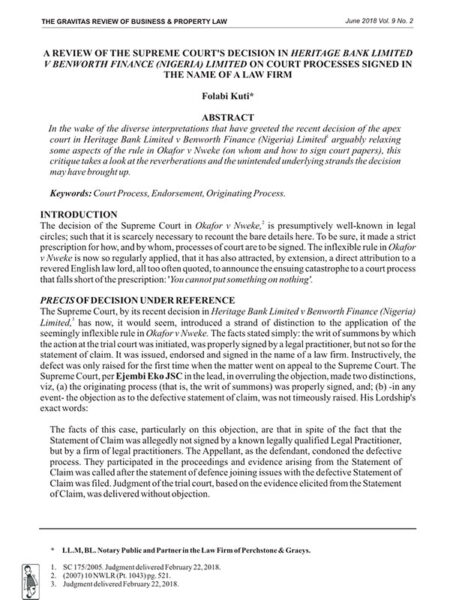
A Review of the Supreme Court’s Decision in Heritage Bank Limited v Benworth Finance (Nig) Ltd on Court Processes Signed in the Name of a Law Firm
0₦2,500.00Folabi Kuti, Partner Perchstone & Graeys, in A Review of The Supreme Court’s Decision in Heritage Bank Limited v Benworth Finance (Nigeria) Limited On Court Processes Signed in the Name of a Law Firm, contemplates the diverse interpretations that have greeted the recent decision of the apex court in the cited case arguably relaxing some aspects of the rule in Okafor v Nweke. Folabi takes a critical look at the reverberations and the unintended underlying strands the decision may have brought up.
-
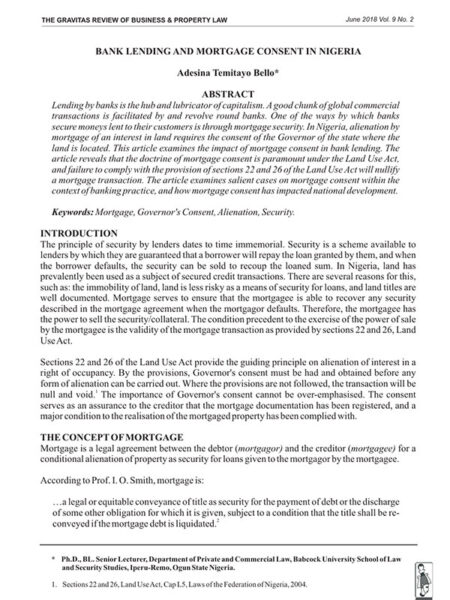
Bank Lending and Mortgage Consent in Nigeria
0₦2,500.00Dr. Adesina Bello, Senior Lecturer, Department of Private and Commercial Law, Babcock University Iperu-Remo in his article, Bank Lending and Mortgage Consent in Nigeria considers the judicial treatment of failure to comply with the provision of sections 22 and 26 of the Land Use Act (LUA) which makes unlawful, and indeed nullifies, any alienation of a right of occupancy without the consent of the Governor first had and obtained. He posits that the restrictive provision of the LUA, and the relative narrow interpretation by the courts may have contributed to the present cumbersome and bureaucratic process of loan documentation, frustration of the concept of securitization, and stifling of the mortgage business in Nigeria.
-
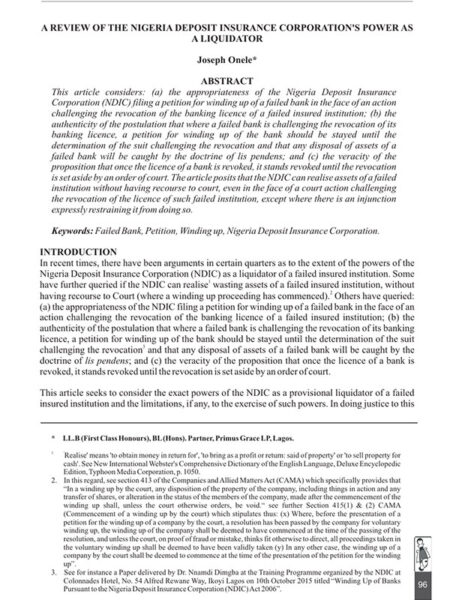
A Review of the Nigeria Deposit Insurance Corporation’s Power as a Liquidator
0₦2,500.00Joseph Onele Partner, Primus Grace LP, in his article, A Review of the Nigeria Deposit Insurance Corporation’s Power as a Liquidator considers the appropriateness of the Nigeria Deposit Insurance Corporation filing a petition for winding up of a failed bank in the face of an action challenging the revocation of the banking licence of a failed insured institution; the authenticity of the postulation that where a failed bank is challenging the revocation of its banking licence, a petition for winding up of the bank should be stayed until the determination of the suit challenging the revocation and the veracity of the proposition that once the licence of a bank is revoked, it stands revoked until the revocation is set aside by an order of court.
-
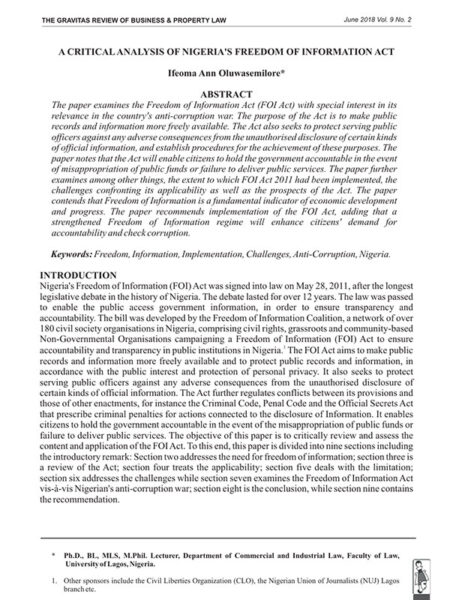
A Critical Analysis of Nigeria’s Freedom of Information Act
0₦2,500.00Dr. Ifeoma Oluwasemilore, Lecturer, Department of Commercial and Industrial Law, Faculty of Law, University of Lagos in her article, A Critical Analysis of Nigeria’s Freedom of Information Act, examines the Freedom of Information Act (FOI Act) with special interest in its relevance in the country’s anti-corruption war. She examines the extent to which FOI Act had been implemented, the challenges confronting its applicability as well as the prospects of the Act. She contends that Freedom of Information is a fundamental indicator of economic development and progress, and recommends a strengthened implementation of the Act, adding that a strong Freedom of Information regime will enhance citizens’ demand for accountability and check corruption.
-
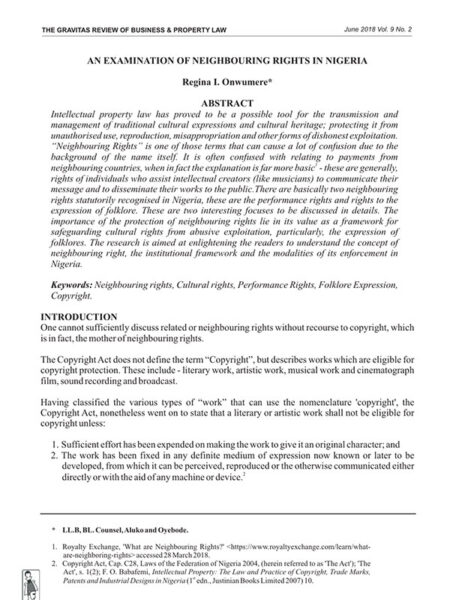
An Examination of Neighbouring Rights in Nigeria
0₦2,500.00Regina Onwumere of the law firm of Aluko & Oyebode in An Examination of Neighbouring Rights in Nigeria notes that intellectual property law has proved to be a useful tool for the transmission and management of traditional cultural expressions and cultural heritage protecting it from unauthorised use, reproduction, misappropriation and other forms of dishonest exploitation. She explains the concept of Neighbouring Rights and its value as a framework for safeguarding cultural rights from abusive exploitation. She considers the legal framework for protection and enforcement of Neighbouring Rights in Nigeria.
-
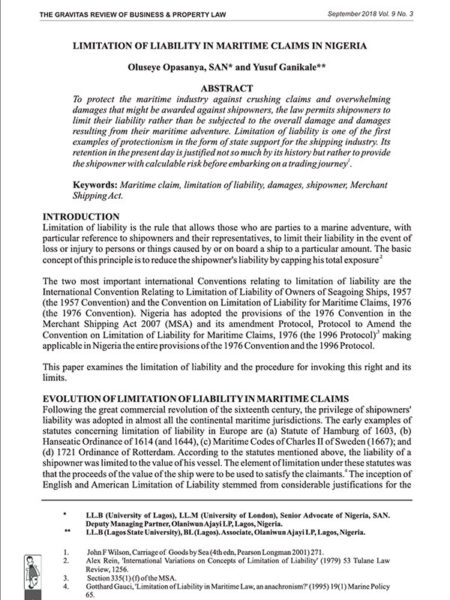
Limitation of Liability in Maritime Claims in Nigeria
0₦2,500.00Oluseye Opasanya SAN, and Yusuf Ganikale, Deputy Managing Partner and Associate respectively at Ajayi LP in their article, Limitation of Liability in Maritime Claims in Nigeria, note that to protect biliathe maritime industry against crushing claims and overwhelming damages that might be awarded against shipowners, the law permits shipowners to limit their liability rather than be subjected to hefty damages resulting from their maritime adventure. They review the provisions of the Merchant Shipping Act 2007 which domesticated the Convention on Limitation of Liability for Maritime Claims, 1976 and its amendment Protocol of 1996, Protocol to Amend the Convention on Limitation of Liability for Maritime Claims, 1976. They distinguish between limitation and liability proceedings, persons who may limit their liability, claims which are subject to limitation, conducts which may defeat limitation and creation of a Limitation Fund.
-
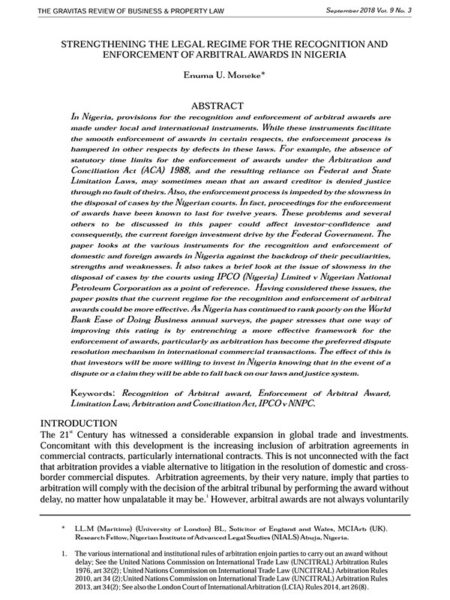
Strengthening the Legal Regime for the Recognition and Enforcement of Arbitral Awards in Nigeria
0₦2,500.00Enuma Moneke, Research Fellow, Nigerian Institute of Advanced Legal Studies, Abuja, in his article, Strengthening the Legal Regime for the Recognition and Enforcement of Arbitral Awards in Nigeria, notes that local and international instruments provide for the recognition and enforcement of arbitral awards in Nigeria. While these instruments facilitate the smooth enforcement of awards in certain respects, the enforcement process is hampered in other respects by defects in these laws. For example, the absence of statutory time limits for the enforcement of awards under the Arbitration and Conciliation Act (ACA) 1988, and the resulting reliance on Federal and States’ Limitation Laws may sometimes mean that an award creditor is denied justice through no fault of theirs. He examines the various instruments for the recognition and enforcement of domestic and foreign awards in Nigeria against the backdrop of their peculiarities, strengths and weaknesses.
-
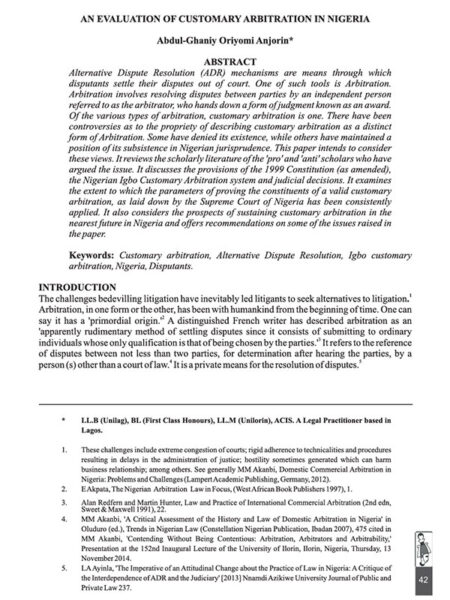
An Evaluation of Customary Arbitration in Nigeria
0₦2,500.00Abdul-Ghaniy Anjorin, in his article, An Evaluation of Customary Arbitration in Nigeria, undertakes a comprehensive overview of Customary Arbitration in Nigeria. He examines the parameters laid down by the Supreme Court in proving a compelling customary arbitration, and how these had been applied in various cases. He concludes with his view on the prospects of sustaining customary arbitration in the nearest future.
-
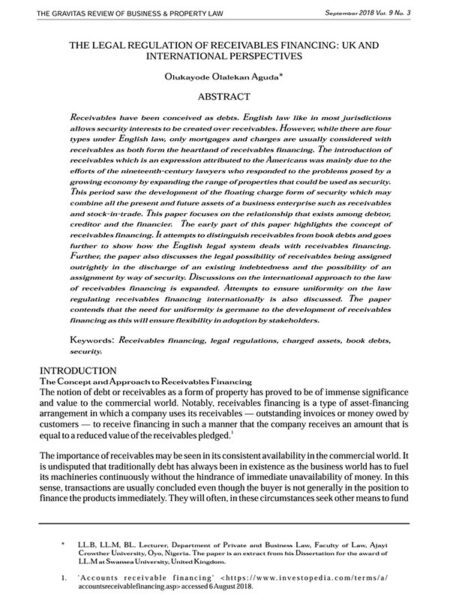
The Legal Regulation of Receivables Financing: The UK and International Perspectives
0₦2,500.00Olukayode Aguda, Lecturer, Department of Private and Business Law, Ajayi Crowther University, Oyo in his article, The Legal Regulation of Receivables Financing: the UK and International Perspectives, notes that receivables are a businessman’s most liquid assets. He highlights the concept of receivables financing, distinguishes receivables from book debts and goes further to show how the English legal system deals with receivables financing. He discusses the legal possibility of receivables being assigned outrightly in the discharge of existing indebtedness and the possibility of an assignment by way of security. He explains the laws of different jurisdictions relating to receivables financing, and international attempts at ensuring uniformity of the law
-
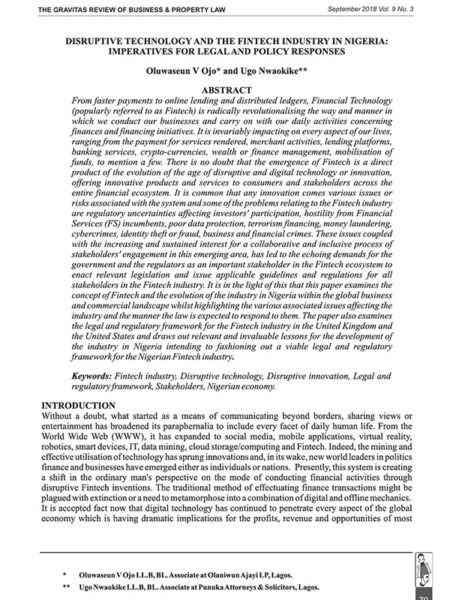
Disruptive Technology and the Fintech Industry in Nigeria: Imperatives for Legal and Policy Responses
0₦2,500.00Oluwaseun Ojo of Olaniwun Ajayi LP, and Ugo Nwaokike of Punuka Attorneys and Solicitors in their article, Disruptive Technology and Fintech Industry in Nigeria: Imperatives for Legal and Policy Responses, note that the emergence of Financial Technology (popularly referred to as Fintech) is a direct product of the age of disruptive and digital innovation. Fintech is impacting on every aspect of lives, ranging from payment for services, merchant activities, lending platforms, banking services, crypto-currencies, wealth and finance management. They appraise issues affecting the Fintech industry in Nigeria including regulatory uncertainties affecting investors’ participation, hostility from Financial Services (FS) incumbents, poor data protection, terrorism financing, money laundering, cyber crimes, identity theft and financial crimes. They review the legal and regulatory framework for the Fintech industry in the United Kingdom and the United States and draw out relevant lessons for the development of the sector in Nigeria.
-
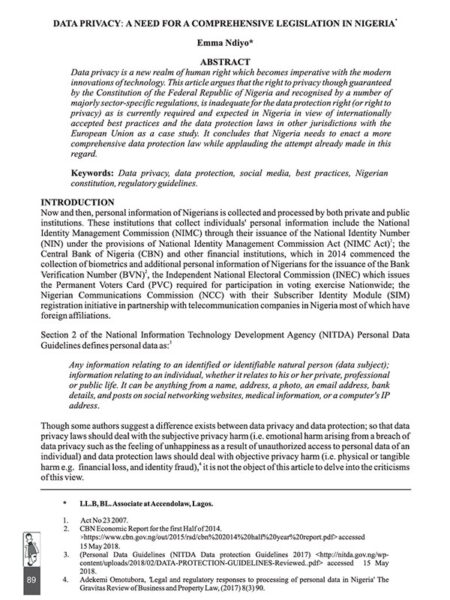
Data Privacy: A Need for a Comprehensive Legislation in Nigeria
0₦2,500.00Emma Ndiyo, Associate, Accendolaw in her article, Data Privacy: A Need for a Comprehensive Legislation in Nigeria notes that ‘Data is the new Oil’ and Data Privacy is a new realm of human right which becomes imperative with the unprecedented innovations in technology and the threats of fraud, phishing scams, and identity theft. She argues that the right to privacy though guaranteed under the Constitution and recognised by some sector-specific regulations, is inadequate given internationally accepted best practices. She examines the EU’s General Data Protection Regulation (GDPR) adopted in May 2018 which compelled big data entities such as Facebook, Google and Twitter to adjust their Terms of Use and Privacy Policy, and concludes that there is the need for an overarching data protection law which would not only enhance data privacy but regulate the collection and processing of personal data.
-
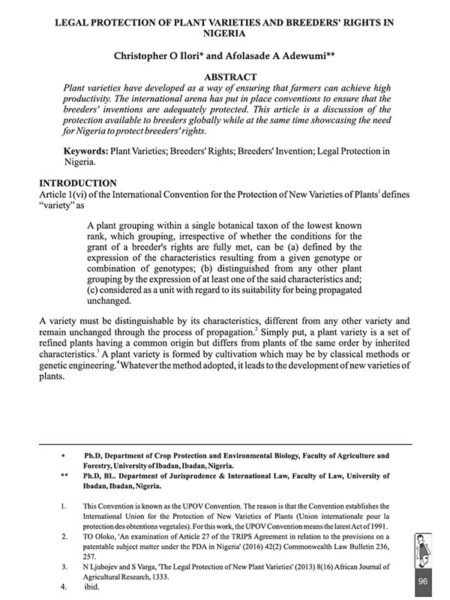
Legal Protection of Plant Varieties and Breeders’ Rights in Nigeria
0₦2,500.00Dr. Christopher Ilori of the Department of Crop Protection and Environmental Biology, University of Ibadan, and Dr. Afolasade Adewumi of the Department of Jurisprudence & International Law, University of Ibadan in their article, Legal Protection of Plant Varieties and Breeders’ Rights in Nigeria consider Intellectual Property Rights in the context of protection of plant varieties and breeders’ inventions. They analyse the nature and the need to protect plant varieties, the Nigerian and international legal regimes for the protection of plant varieties and breeders’ rights including a discussion of plant varieties protection under the Agreement on Trade-Related Aspects of Intellectual Property Rights, TRIPs.
The Gravitas Review of Business & Property Law



